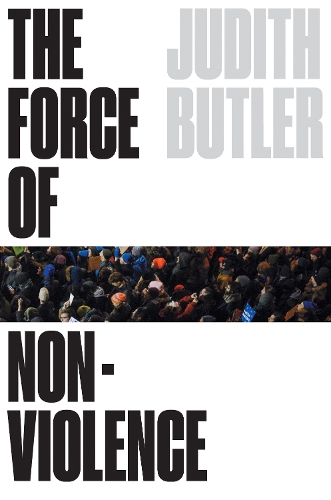
The Force of Nonviolence: An Ethico-Political Bind
(Hardback)
Available Formats
Publishing Details
The Force of Nonviolence: An Ethico-Political Bind
By (Author) Judith Butler
Verso Books
Verso Books
11th February 2020
United Kingdom
Classifications
General
Non Fiction
Political science and theory
Social and political philosophy
Ethics and moral philosophy
179.7
Physical Properties
Hardback
224
Width 140mm, Height 210mm, Spine 19mm
323g
Description
Judith Butlers new book shows how an ethic of nonviolence must be connected to a broader political struggle for social equality. Further, it argues that nonviolence is often misunderstood as a passive practice that emanates from a calm region of the soul, or as an individualist ethical relation to existing forms of power. But, in fact, nonviolence is an ethical position found in the midst of the political field. An aggressive form of nonviolence accepts that hostility is part of our psychic constitution, but values ambivalence as a way of checking the conversion of aggression into violence. One contemporary challenge to a politics of nonviolence points out that there is a difference of opinion on what counts as violence and nonviolence. The distinction between them can be mobilised in the service of ratifying the states monopoly on violence. Considering nonviolence as an ethical problem within a political philosophy requires a critique of individualism as well as an understanding of the psychosocial dimensions of violence. Butler draws upon Foucault, Fanon, Freud, and Benjamin to consider how the interdiction against violence fails to include lives regarded as ungrievable. By considering how racial phantasms inform justifications of state and administrative violence, Butler tracks how violence is often attributed to those who are most severely exposed to its lethal effects. The struggle for nonviolence is found in movements for social transformation that reframe the grievability of lives in light of social equality and whose ethical claims follow from an insight into the interdependency of life as the basis of social and political equality.
Reviews
Praise for Frames of War:
A trenchant and brilliant book. -- Mike Rowe * Utne Reader *
Praise for Frames of War:
It's clear that its author is still interested in stirring up trouble-academic, political and otherwise. * Bookforum *
Praise for Frames of War:
Judith Butler is quite simply one of the most probing, challenging, and influential thinkers of our time. -- J. M. Bernstein
Praise for Frames of War:
Judith Butler is the most creative and courageous social theorist writing today. Frames of War is an intellectual masterpiece that weds a new understanding of being, immersed in history, to a novel Left politics that focuses on State violence, war and resistance. -- Cornel West
Praise for Frames of War:
An impressive and challenging book from one of the leading intellectuals of our time. * Diva *
Praise for Precarious Life:
A book that shines with the splendor of engaged thought. * Brooklyn Rail *
Praise for Precarious Life:
Here is a unique voice of courage and conceptual ambition that addresses public life from the perspective of psychic reality, encouraging us to acknowledge the solidarity and the suffering through which we emerge as subjects of freedom. -- Homi K. Bhabha
Butler's philosophical inquiry argues that it is in fact a shrewd and even aggressive collective political tactic. * New York Times *
Perhaps the most influential and widely travelled feminist in the Western academy...[Butler] carefully, with assertive toughness, combats the hatred, fear and rage of those who respond violently to her continuous commitment to confronting normative patterns of coercion with calls for concerted actions of resistance. -- Lynne Segal * Times Higher Education *
Judith Butler lucidly enumerates the obstacles nonviolence faces in a time when it is sorely needed. Drawing on works from Frantz Fanon, Michel Foucault, Walter Benjamin, and Sigmund Freud, she makes a fresh new case for what destructive obstacle our pervasive individualism is to nonviolent action - and the change possible with it. -- John Freeman * The Boston Globe *
Featured in The New Yorker * The New Yorker *
[The Force of Nonviolence] walks us through a route of emancipation that has not been approached previously, but which seems, once pursued, recognisable and familiar. * LSE Review of Books *
Judith Butler has achieved a status that few other living academics have acquired: For each published work that she issues, reams of discussion and critique are produced in response, so much so that they have engendered microdisciplines in the many fields in which she is an expert: gender, politics, literary studies, and more. -- Francis Wade * The Nation *
Drawing on thinkers from Sigmund Freud to Frantz Fanon, Butler untangles deep-seated misunderstandings about what constitutes violence and nonviolence, to suggest new paths forward. * Jewish Currents *
Vital, and chillingly timely. -- Hettie Judah * i newspaper *
[The Force of Nonviolence] avoids rehashing tired moral and strategic condemnations of violence. Butler reminds us that what is deemed violence or nonviolence is a matter of interpretation and that the state maintains a monopoly on deciding which forms of violence are legitimate, and which acts are understood to constitute violence at all. -- Natasha Lennard * Bookforum *
Author Bio
Judith Butler is Maxine Elliot Professor of Comparative Literature and Critical Theory at the University of California, Berkeley. She is the author of numerous books including Precarious Life (Verso, 2004), Frames of War (Verso, 2009), and Towards a Performative Theory of Assembly (Harvard University Press, 2015).
